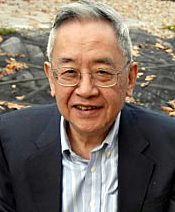Why Awarded
Yu Ying-shih has been described by his peers as “the greatest Chinese intellectual historian of our generation.” His knowledge encompasses nearly the entire span of Chinese history, from early times to the present and his work is read and discussed throughout the Chinese-speaking world. In addition, Yu is a vocal critic of the Chinese Communist Party and champion of the pro-democracy movement in mainland China.
Citation
"Dr. Yu’s scholarship has been remarkably deep and widespread. His impact on the study of Chinese history, thought and culture has reached across many disciplines, time periods and issues, examining in a profound way major questions and deeper truths about human nature."
—Librarian of Congress James H. Billington
Press
- Two History Scholars Are to Split $1 Million Award
The New York Times - Nov. 15, 2006 - Library of Congress Honors Two Historians With Kluge Prize
The Washington Post - Nov. 15, 2006
Bio
Yu Ying-shih has been described by his peers as “the greatest Chinese intellectual historian of our generation.” His knowledge encompasses nearly the entire span of Chinese history, from early times to the present and his work is read and discussed throughout the Chinese-speaking world. In addition, Yu is known as a vocal critic of the Chinese Communist Party and champion of the pro-democracy movement in mainland China.
The author of more than 30 books spanning 2,000 years of history, Yu's scholarly career in the United States began with a concentration on early and medieval Chinese history. His doctoral dissertation addressed the significant transformation of the ideal of longevity into the idea of immortality—a subject of sustained interest in Chinese culture. The published study remains a classic account of a critical shift in religious thinking. In his first English-language book, he turned his attention to the Chinese hierarchical view of the world that framed martial and commercial expansion during the Han dynasty (203 B.C. to 220 A.D.).
In 1970 Yu published an interpretive article in Chinese, “A Consideration of the History of the Qing Thought from the Perspective of the Development of Song-Ming Confucianism” that displayed a command of the full span of Confucian thought, from the classical period prior to 231 B.C. up through the 19th century. In 1972 he published groundbreaking research on the major thinker Fang Yizhi (1611-1671). Asked in the 1990s to write a short historical introduction to the collected works of Zhu Xi (1130-1200), the most influential Confucian after Confucius himself, Yu produced a 600-page book that fundamentally reinterpreted this towering figure.
Yu's scholarly output can be loosely clustered under three headings: early and medieval Chinese history, intellectual and cultural history of the later imperial period (the Song, 960-1279; Ming, 1368-1644; and Qing, 1644-1911 dynasties) and studies of intellectuals and intellectual problems in the modern period. Yu is credited with rescuing the Confucian heritage from caricature and neglect and with stimulating younger scholars to rediscover the richness and variety of Chinese culture after the “cultural revolution.”
In addition to his scholarship, Yu is known for his sympathy for the democracy movement in mainland China and his support for young refugees who left China after the suppression of protesters in Tiananmen Square. Yu is an outspoken critic of the Chinese Communist Party and an advocate for human rights and human dignity as basic values in both Chinese and Western cultures. His writings are widely read and admired on the mainland, Hong Kong, Taiwan, and other nations in East Asia.
Yu is an Emeritus Professor of East Asian Studies and History at Princeton University. During his academic career, which began in 1962, he has taught at three Ivy League universities (Princeton, Harvard, and Yale) and the University of Michigan. He also served concurrently as president of New Asia College, Hong Kong, and vice chancellor of Chinese University of Hong Kong from 1973 to 1975.

YU YING-SHIH
The Advocate for Chinese Democracy
Kluge Prize Recipient 2006
Quick Facts
Born:
1930, Tianjin, China
Field:
History
Positions:
Assistant Professor, University of Michigan
Professor, Harvard University
President, New Asia College, Hong Kong
Charles Seymour Professor of History, Yale University
Michael Strater University Professor, Princeton University
Ceremony Links
Prize Awarded:
December 5, 2006
Acceptance Speech:
Watch Video
Read Full Text (PDF, 226KB)
News Release:
Yu, Hope Franklin Share Kluge Prize
(Nov. 15, 2006)
Selected Publications
- "Trade and Expansion in Han China" (1967)
- "Lishi yu sixiang [History and Thought]" (1976)
- "Zhongguo jinshi zongjiao lunli yu shangren jingshen [Religious Ethics and the Mercantile Spirit in Early Modern China]" (1987)
- "Shi yu Zhongguo wenhua [Intellectuals and Chinese Culture]" (1987)
- "Democracy, Human Rights and Confucian Culture" (2000)
- "Lun tianren zhi ji – Zhongguo gudai sixiang qiyuan tanshi [Between Heaven and Humanity: An Inquiry into the Origins of the Chinese Mind in Classical Antiquity]" (2014)
